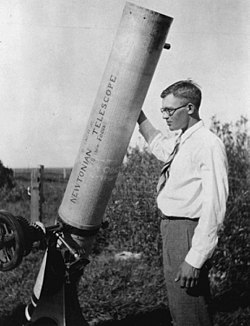Clyde Tombaugh Quote
Related Quotes
This is a day of celebration!Today, we are divorcing the pastand marrying the present.Dance,and you will find Godin every room.Today, we are divorcing resentmentand marrying forgiveness.Sing,and God w...
Kamand Kojouri
Tags:
accept, acceptance, apathy, beloved, bitter, bitterness, celebrate, celebrating, celebration, ceremony
About Clyde Tombaugh
Clyde William Tombaugh (; February 4, 1906 – January 17, 1997) was an American astronomer and telescope maker, renowned for discovering Pluto in 1930. This marked the first detection of what would eventually be recognized as the Kuiper belt, a vast region of icy bodies beyond Neptune. At the time, Pluto was heralded as the ninth planet in the Solar System, a classification that stood for over seven decades. Tombaugh's discovery was a monumental milestone in 20th-century astronomy and established his legacy as one of the few individuals to discover a major planetary body.
Born in Illinois and raised on farms in Kansas, Tombaugh was largely self-educated in astronomy and optical engineering, building his own telescopes from spare parts and grinding lenses by hand. His skill and determination led to a position at Lowell Observatory in Flagstaff, Arizona, where he conducted meticulous photographic surveys of the night sky. In addition to Pluto, Tombaugh identified hundreds of asteroids and a variety of star clusters, galaxies, and variable stars, contributing significantly to the cataloging of the night sky.
Throughout his career, Tombaugh remained deeply involved in planetary science and instrumentation. As a professor at New Mexico State University, he led the Planetary Patrol project, which helped determine Mercury's rotation period, monitored Jupiter's Great Red Spot, and developed new photographic techniques for satellite searches. Even after retiring in 1973, Tombaugh continued to construct telescopes, support observational programs, and advocate for rigorous scientific inquiry—including into the study of Unidentified flying objects (UFOs), which he believed merited serious investigation.
Born in Illinois and raised on farms in Kansas, Tombaugh was largely self-educated in astronomy and optical engineering, building his own telescopes from spare parts and grinding lenses by hand. His skill and determination led to a position at Lowell Observatory in Flagstaff, Arizona, where he conducted meticulous photographic surveys of the night sky. In addition to Pluto, Tombaugh identified hundreds of asteroids and a variety of star clusters, galaxies, and variable stars, contributing significantly to the cataloging of the night sky.
Throughout his career, Tombaugh remained deeply involved in planetary science and instrumentation. As a professor at New Mexico State University, he led the Planetary Patrol project, which helped determine Mercury's rotation period, monitored Jupiter's Great Red Spot, and developed new photographic techniques for satellite searches. Even after retiring in 1973, Tombaugh continued to construct telescopes, support observational programs, and advocate for rigorous scientific inquiry—including into the study of Unidentified flying objects (UFOs), which he believed merited serious investigation.
